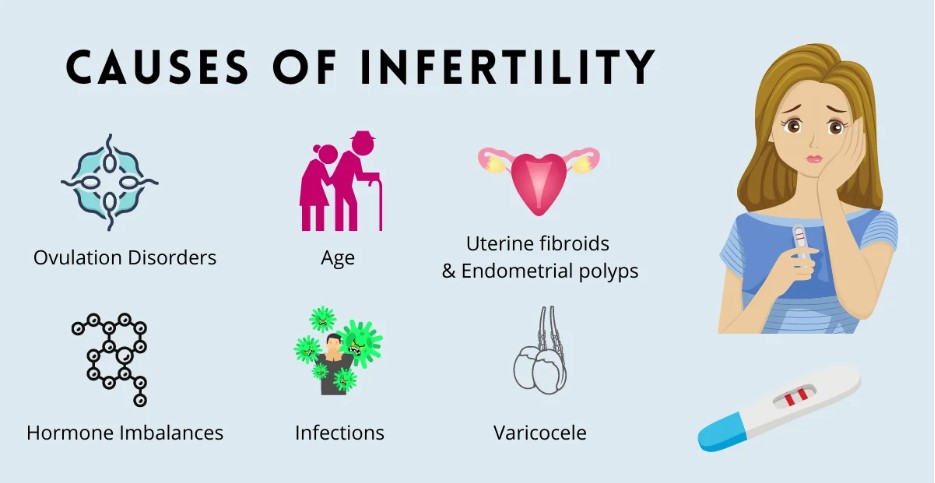Infertility is defined as the inability to conceive after one year of regular, unprotected intercourse. For women over the age of 35, this timeframe is reduced to six months. Infertility can result from issues with the woman, the man, or a combination of both. Let’s delve into some of the most common causes of infertility in women.
1. Ovulation Disorders
Ovulation disorders are among the most frequent causes of infertility in women. These disorders can prevent the release of eggs from the ovaries and include conditions such as:
- Polycystic Ovary Syndrome (PCOS): This hormonal imbalance affects ovulation and is characterized by irregular menstrual cycles, excess hair growth, and obesity.
- Hypothalamic Dysfunction: Stress, significant weight loss or gain, and excessive exercise can disrupt the hormones responsible for ovulation.
- Premature Ovarian Insufficiency: Also known as early menopause, this condition occurs when the ovaries stop functioning properly before the age of 40.
2. Fallopian Tube Damage
The fallopian tubes play a crucial role in the fertilization process. Damage or blockages in the tubes can prevent the sperm from reaching the egg. Common causes of fallopian tube damage include:
- Pelvic Inflammatory Disease (PID): Often caused by sexually transmitted infections, PID can lead to scarring and blockages in the fallopian tubes.
- Endometriosis: This condition involves the growth of uterine tissue outside the uterus, which can affect the fallopian tubes and ovaries.
- Previous Surgeries: Surgeries in the pelvic region, especially those involving the fallopian tubes, can result in scarring and adhesions.
3. Uterine or Cervical Issues
Abnormalities in the uterus or cervix can hinder the implantation of a fertilized egg or increase the likelihood of miscarriage. These issues can include:
- Fibroids: Noncancerous growths in the uterus that can obstruct the fallopian tubes or interfere with implantation.
- Polyps: Benign growths on the inner wall of the uterus that can affect fertility.
- Congenital Abnormalities: Structural issues present from birth, such as a septate uterus, can impact fertility.
- Cervical Stenosis: Narrowing of the cervix can make it difficult for sperm to enter the uterus.
4. Age-Related Factors
As women age, the quantity and quality of their eggs decline. This natural process becomes more pronounced after the age of 35, significantly affecting fertility. Older women are also more likely to experience miscarriages and chromosomal abnormalities in their pregnancies.
5. Unexplained Infertility
In some cases, infertility remains unexplained despite thorough evaluations. This can be one of the most frustrating diagnoses, as it provides no clear path for treatment. However, advances in reproductive medicine continue to offer hope and potential solutions for couples facing unexplained infertility.
Seeking Help and Treatment
If you are struggling with infertility, it is essential to seek help from a specialist who can guide you through the various diagnostic and treatment options available. At our clinic, we provide comprehensive Infertility Treatment in Pratap Nagar, Jaipur, tailored to meet the unique needs of each patient. Our services include:
- Fertility Testing: Thorough assessments to identify potential causes of infertility.
- Ovulation Induction: Medications to stimulate ovulation.
- Intrauterine Insemination (IUI): A procedure that places sperm directly into the uterus.
- In Vitro Fertilization (IVF): Assisted reproductive technology that involves fertilizing an egg outside the body and implanting it in the uterus.
- Surgical Interventions: Procedures to correct structural issues affecting fertility.
Infertility can be a challenging and emotional journey, but with the right support and treatment, many women can achieve their dream of becoming mothers. If you have concerns about your fertility, don’t hesitate to reach out to our clinic for a consultation. Together, we can explore the best path forward and take steps toward building the family you desire.






Comments